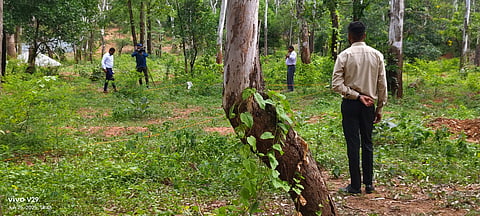

A public notice released by the Bruhat Bengaluru Mahanagara Palike (BBMP) concerning the construction of a new academic and research block at Bangalore University (BU) has ignited opposition from environmentalists and university students. The proposed project would necessitate the felling of about 419 trees on campus.
The new block is to be constructed at the University Visvesvaraya College of Engineering within BU’s Jnanabharati campus under the Pradhan Mantri Uchchatar Shiksha Abhiyan (PM-USHA). On April 16, the university wrote to the BBMP seeking permission to clear the trees, sparking protests from students and activists.
The Jnanabharathi campus is considered a vital ecological asset to Bengaluru. Presently the Bio-Park on campus contains 300 species and 3 lakh plants, five check dams and a total of eight bore wells, according to the university’s website.
“This development poses a direct threat to the university’s vital bio-park,” said Lokesh Ram, working president of the students’ union. He said that although the trees haven’t been cut yet, the area had been fenced off and the grass and other vegetation had been cleared.
Diminishing green cover
The current proposal by the BBMP is the latest in the series of events and longstanding concerns regarding the diminishing green cover at BU.
In March 2025, BBMP proposed a 250-metre skydeck on the varsity’s expansive Jnanabharathi campus. This project, envisioned to boost tourism, was met with immediate and fierce opposition by the students.
In September 2022, approximately 40 trees, including medicinal ones, were cut by the Inter-University Centre for Yogic Sciences on the Jnanabharathi campus.
A retired professor of geology and environmental activist, TJ Renuka Prasad, said, “The campus’s remaining forest areas are merely a reminiscence of what it used to be.”
Prasad, who once coordinated the development of the bio-parks on campus, recalled that the students, along with teachers, took the initiative to develop 16 such biopark patches without funding from the state government or the university.
He said that he had created an online campaign to raise objections to the proposed cutting of trees which involved sending an email to the Deputy Conservator of Forests and other authorities.
According to Lokesh, students, teachers and environmental activists are working to make the university campus a biodiversity heritage campus under the Biological Diversity Act, 2002.
In May, Minister for Forest, Ecology and Environment Eshwar B Khandre wrote to the Karnataka Biodiversity Board (KBB) asking them to prepare a detailed proposal to declare the campus a biodiversity heritage site.
“We are not against development, but with around 29 large buildings already here, it is better to use this existing infrastructure rather than spoiling our bioparks,” says Prasad.
Apart from the students’ union, the teachers and the non-teaching staff have also expressed similar concerns, according to Prasad.
“While no formal petitions have been filed yet, the collective cry to avoid further encroachments and deforestation is continuing,” says Lokesh.